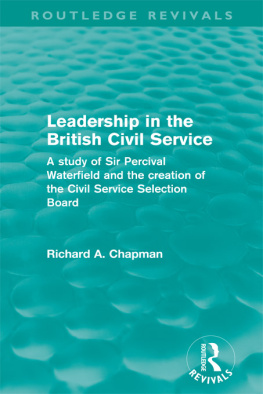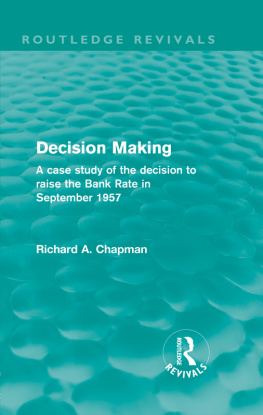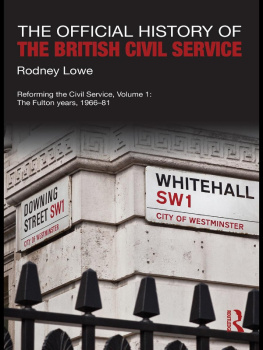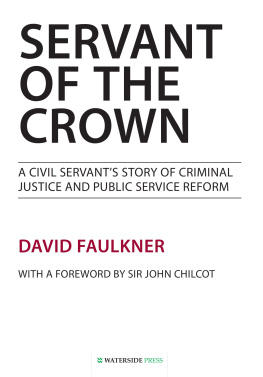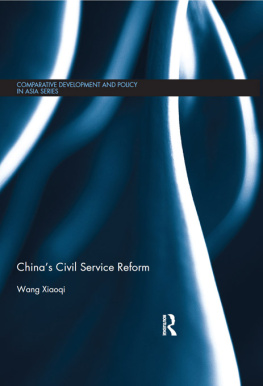Routledge Revivals
Leadership in the British Civil Service
First published in 1984, this book examines the style of leadership amongst senior civil servants and its impact on administrative reform by investigating the work of Sir Percival Waterfield who was First Civil Service Commissioner from 1939 to 1951. He was responsible for setting up the Civil Service Selection Board which was the key institution in the pioneering new approach to personnel selection initiated in Britain after the Second World War. It has been regarded as the model for personnel recruitment in other contexts and for civil service recruitment in other countries.
The book raises fundamental questions about the criteria for recruitment and promotion of leading officials in British central government and offers a rare glimpse of the day to day work of top civil servants and the administrative culture in which they operate.
Leadership in the British Civil Service
A study of Sir Percival Waterfield and the creation of the Civil Service Selection Board
Richard A. Chapman
First published in 1984
by Croom Helm Ltd
This edition first published in 2011 by Routledge
2 Park Square, Milton Park, Abingdon, Oxon, OX14 4RN
Simultaneously published in the USA and Canada
by Routledge
711 Third Avenue, New York, NY 10017
Routledge is an imprint of the Taylor & Francis Group, an informa business
1984 R. A. Chapman
All rights reserved. No part of this book may be reprinted or reproduced or utilised in any form or by any electronic mechanical, or other means, now known or hereafter invented, including photocopying and recording, or in any information storage or retrieval system, without permission in writing from the publishers.
Publishers Note
The publisher has gone to great lengths to ensure the quality of this reprint but points out that some imperfections in the original copies may be apparent.
Disclaimer
The publisher has made every effort to trace copyright holders and welcomes correspondence from those they have been unable to contact.
A Library of Congress record exists under ISBN: 0709934025
ISBN 13: 978-0-415-50816-2 (hbk)
ISBN 13: 978-0-203-12570-0 (ebk)
Leadership in the British Civil Service
A Study of Sir Percival Waterfield and the creation of the Civil Service Selection Board
RICHARD A. CHAPMAN
University of Durham
1984 R.A. Chapman
Croom Helm Ltd, Provident House, Burrell Row,
Beckenham, Kent BR3 1AT
Croom Helm Australia Pty Ltd, First Floor, 139 King Street,
Sydney, NSW 2001, Australia
British Library Cataloguing in Publication Data
Chapman, Richard A.
Leadership in the British civil service.
1. Waterfield, Sir Percival 2. Great Britain
Officials and employees Biography
I. Title
354.410060924 JN425.W1/
ISBN 0-7099-3402-5
Printed and bound in Great Britain by
Biddies Ltd, Guildford and Kings Lynn
Contents
Acknowledgements
I wish to record my thanks to the following people and institutions for help received in various ways. The Social Science Research Council awarded me a small project grant, mainly for travel expenses, and the University of Durham granted me a sabbatical term to enable me to make progress with writing up the research. The Waterfield family, especially Lady Waterfield, Mr J.P. Waterfield and Mrs R.H. Ellingworth, patiently answered questions during interviews and provided much appreciated encouragement while the research was in progress. The following provided helpful contacts and/or granted access to documents: Mr D.M. Nooney, Chief Registrar HM Treasury, for access to Treasury files; Miss Angela Raspin, Chief Archivist of the British Library of Political and Economic Science, for access to the diary of Lord Dalton; Mrs Lorna Poole, Archivist of the John Lewis Partnership; Professor J.H. Reed, Curator of the United Methodist Archives Center, Ohio Wesleyan University; Mr Michael J. Hellyer, Academic Liaison Officer of the Canadian High Commission in London; M Marcel Gingras, Secretary to the Public Service Commission of Canada; Dr F.H. Allen and Mr C.E.H. Tuck of the Civil Service Commission; and numerous other individuals, including serving and retired civil servants, who offered recollections of Sir Percival Waterfield. The following have granted permission to quote copyright material: The Controller HM Stationery Office, for permission to quote from copyright material in the Public Record Office; and Dr Jill Pellew, for permission to quote from her book, The Home Office, 1848-1914. My special thanks must be expressed to the following who, at short notice, read the manuscript in draft and made helpful comments: Dr R.L. Borthwick, Professor R.K. Brown, Dr J.R. Greenaway, Mr Barry J. OToole, Dame Enid Russell-Smith, and Mr J.P. Waterfield. The responsibility for the final manuscript is, of course, mine alone.
Preface
When Professor Lord Simey and I had one of our many private discussions about the work of the Fulton Committee on the Civil Service (of which Simey was a member and for which I was commissioned to do research) we agreed that there were serious gaps in the existing literature on the subject. We regretted that there was so little published material of a rigorous biographical sort about the work of top civil servants and we also regretted that there were serious deficiencies in the more general literature on the day to day work of the civil service. We mentioned a few men who had clearly made their mark in the civil service and agreed how useful it would have been to know more about them and their work, but unfortunately there was insufficient time for the Fulton Committee to concern itself with such projects. However, I resolved that at some future date I would apply myself to a project of this sort. For about fifteen years other work prevented me from doing this.
My work with John Greenaway, which resulted in the publication, in 1980, of The Dynamics of Administrative Reform, rekindled my enthusiasm for the idea. In my researches into the civil service in mid-twentieth century Britain I became fascinated by reforms in personnel selection and, in particular, became intrigued by the role of Sir Percival Waterfield (of whom I previously knew nothing). It seemed to me that here was a topic for research that might satisfy my desire to work on some biographical material, might contribute to our knowledge of how the civil service actually works, or worked in relation to a particular development, and might also have some practical relevance in terms of future civil service reform. After some preliminary investigations and three years hard research on a spare-time basis with difficulties in working some 300 miles from my main research resources this book is the result.
It has not been an easy book to write. Civil servants are not like politicians or other public figures who keep private papers and who must accept that their private lives become public. Indeed, their private lives are rarely of much interest to people who are not their personal friends. Nevertheless, insights into the sorts of people they are may be gleaned from their evidence to official committees and from comments of their own and others on numerous official files. I think Waterfield and his colleagues emerge from this study as people with hopes, fears and prejudices, like everyone else. However, this book contains no dramatic revelations, no intimate details about private relationships, and no scandals or other material likely to be worthy of serialisation or publication in extract form in Sunday newspapers in the way that many biographical studies become so widely known.

